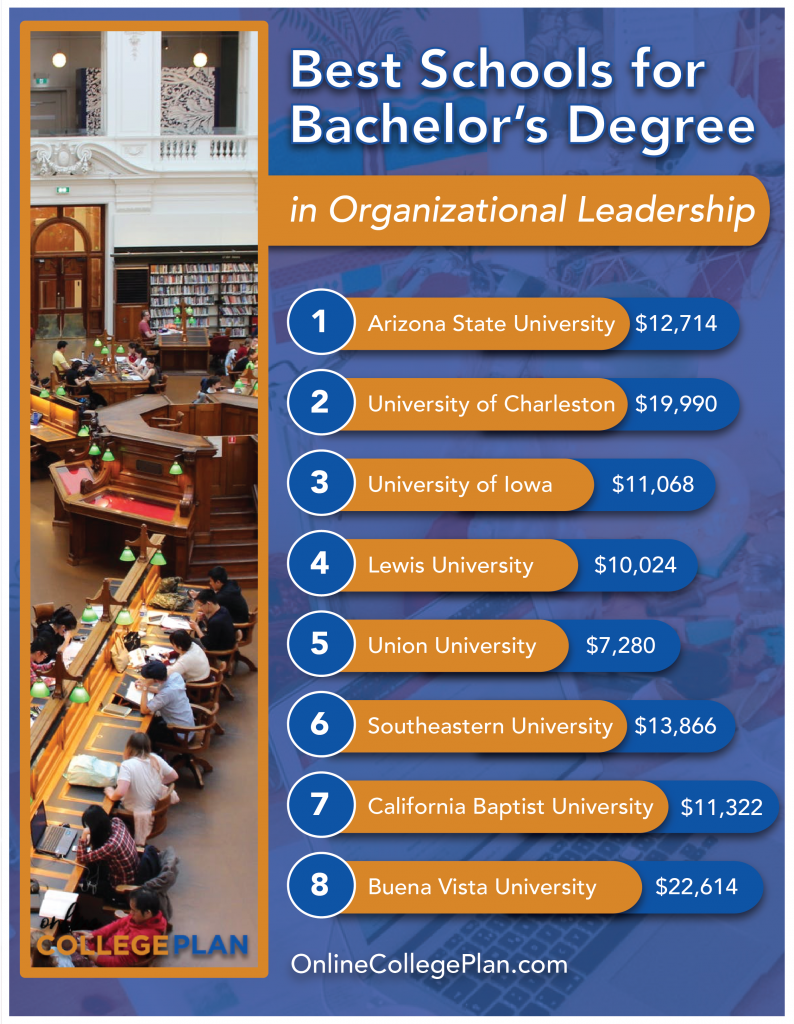Highest Paying Organizational Leaderships Jobs
Find your degree
This article explores the highest-paying organizational leadership careers. We’ll define organizational leadership and how to gain the skills needed to assume such roles. We’ll also discuss organizational leadership and supervision salary information. Is an organizational leadership degree worth it? Read on to find out!

What is Organizational Leadership?
A specific type of leadership demonstrated in the workplace is called organizational leadership. “Organizational leader” is not an actual title. Instead, it’s a set of in-demand leadership skills. This type of leadership involves directing and managing people to help a company achieve its goals. Team coaches, CEOs, and military generals are examples of organizational leaders. So are teachers, supervisors, and administrators. Basically, anyone in charge could be thought of as an organizational leader. Organizational leadership teaches people how to lead most effectively.
Organizational leadership is also more than just a set of skills. It’s really about people. Those with strong organizational leadership abilities create a culture of trust in the workplace. A good organizational leader makes employees feel supported. And this helps to create a positive work environment.
This degree, by taking a more human centered approach to understanding how to successfully run and manage an organization, equips individuals with skills necessary to improving work relationships. It also makes one better at resolving conflicts, boosting productivity amongst team members, and facilitating ethical organizational practices. Additionally, you become better at critical and analytical thinking, especially regarding human behavior.
Akash Karia, Speaker, Coach, and Bestselling Author
You may also like: Top 10 Online Bachelors Degrees in Business Administration
What Is an Organizational Leadership Degree?
An organizational leadership degree is a program of study offered at many colleges. It focuses on developing the skills to lead and manage teams or entire organizations. This degree provides students with comprehensive training in leadership principles.
Students in an organizational leadership program learn a variety of skills. And the degree prepares graduates for a wide range of organizational leadership careers. Additionally, the knowledge gained in an organizational leadership program can be applied to a wide range of industries and career paths. This could include organizational leadership careers in business, healthcare, education, government, nonprofit organizations, and many others.
Are you considering pursuing a bachelor’s degree in organizational leadership online? If so, be sure to explore our latest post, where we’ve meticulously ranked the top ten online organizational leadership programs for undergraduate students. Whether you’re seeking flexibility, academic excellence, or career-focused curricula, our comprehensive ranking will provide valuable insights to guide your decision-making process. Considering pursuing your master’s degree in organizational leadership? We’ve got you covered. Check out the 30 Best Online Master’s in Organizational Leadership Programs!
What Types of Organizational Leadership Degrees Are Available?
Organizational leadership degrees are offered at both the undergraduate and graduate levels. A bachelor’s degree in organizational leadership is the place to start if you want to pursue an organizational leadership career. A bachelor’s degree program takes about four years to complete.
A graduate degree in organizational leadership is a more advanced program. A master’s degree typically take two years to complete. They are designed for students who already have a bachelor’s degree. Such programs cover more comprehensive leadership topics. And they can help students advance in their current roles. They can also help secure some of the highest-paying organizational leadership jobs in the field.
Some universities also offer doctoral programs in organizational leadership. These programs are typically designed for students who want to pursue organizational leadership jobs in research or academia. However, they may also be suitable for those seeking high-level organizational leadership careers.
Are you considering pursuing a bachelor’s degree in organizational leadership online? If so, be sure to explore our latest post, where we’ve meticulously ranked the top ten online organizational leadership programs for undergraduate students. Whether you’re seeking flexibility, academic excellence, or career-focused curricula, our comprehensive ranking will provide valuable insights to guide your decision-making process. Considering pursuing your master’s degree in organizational leadership? We’ve got you covered. Check out the 30 Best Online Master’s in Organizational Leadership Programs!
Special Thanks to Our Expert Contributor, Akash Karia, Speaker, Coach, and Bestselling Author.
Can You Study Organizational Leadership Online?
Absolutely! Many colleges feature online programs in organizational leadership. These remote learning programs allow students to complete coursework from anywhere with an internet connection. And they are a convenient option for working students who cannot attend traditional on-campus classes.
When choosing an online organizational leadership program, there are a few things to consider. First, it’s vital to make sure the school is accredited. This ensures the program meets specific academic standards. You’ll also want to consider faculty experience, cost, and the program’s reputation. Finally, check out the course offerings to make sure they align with your overall goals.
While online programs offer flexibility and convenience, they also require self-discipline. You will need to have good time management skills to stay on track with your assignments. Most online schools have academic advisors and coaches who will support you on your journey. Be sure to take advantage of all the resources available to you. This way, you’ll have the best chance of completing your organizational leadership program successfully.
See also: How Online College Can Help You Change Careers
What Do You Study During an Organizational Leadership Degree Program?
The specific courses required for this degree will vary. For example, a master’s degree program will feature more advanced coursework than a bachelor’s degree. However, some of the most common courses include:
- Organizational Behavior and Theory
- Leadership and Ethics
- Strategic Planning and Implementation
- Human Resources Management
- Project Management
- Communication and Conflict Resolution
- Leadership and Diversity
- Organizational Change and Development
Concentrations in Organizational Leadership
Often, students may also choose specializations to complement an organizational leadership degree program. This can help them tailor their degree to specific organizational leadership careers. For example, many organizational leadership programs offer specializations in:
- Human Resources Management
- Nonprofit Leadership
- Healthcare Leadership
- Education Leadership
- Sports Leadership
You may also be interested in the Top 20 Highest Paid Careers for Those with Online Degrees
Where Can You Get an Organizational Leadership Degree?
Organizational leadership degree programs are offered by many colleges in the United States. Each college is different and may even title the degree program differently. But all are meant to prepare students for leadership positions. Below, we have listed some top schools offering organizational leadership bachelor’s degree programs. The listed tuition for these bachelor’s degree programs is based on in-state costs, according to NCES College Navigator.
Best Bachelor’s Degree Programs in Organizational Management

What Are the Highest Paying Organizational Leadership Careers?
So, what can you do with a degree in organizational leadership? As it turns out, there are quite a few organizational leadership jobs to pursue. Organizational leadership degree holders are prepared for a variety of roles. Below is a list of the highest-paying careers for those with a degree in organizational leadership. It also includes organizational leadership salary information.
Remember that for those with an organizational leadership degree, salary information is based on individual roles. Many of these organizational leadership jobs require a high level of education and experience. And the salaries for organizational leadership jobs can vary based on factors such as location, industry, and experience. For example, for those with a bachelor’s organizational management degree, salary will be different than an organizational leadership master’s salary.
Best Paying Jobs for Organizational Management Degree Graduates
Medical and Health Services Manager
Median Annual Salary: $101,340
We’ll start with one of the fastest-growing occupations for organizational leaders: Health Services Managers. Medical and Health Services Managers oversee the operations of a healthcare facility. Health Services Managers take care of the budgets, coordinate services, and supervise staff. And they ensure that patients receive high-quality care.
Medical and Health Services Managers might also ensure compliance with regulations. In addition, they work with healthcare providers, insurance companies, and other organizations. The job of Health Services Managers is to ensure patients have access to the care they need.
Medical and Health Services Managers may also perform data analysis. This is done to evaluate a healthcare program’s effectiveness and identify improvement areas. The goal of a health services manager is to ensure that patients receive the best possible care. And they also make sure the healthcare facility operates efficiently.
This is one of the fastest-growing fields for those with organizational leadership skills. It is expected to grow by 28% through 2031. This is much higher all occupations combined. The Bureau of Labor Statistics projects 56,600 openings for medical and health services managers annually over the next decade.
Are you looking for your niche in organizational leadership? Medical and health services might be an area to consider. If you’re seeking a high-paying job in organizational leadership, most healthcare organizations are always hiring.
Chief Executive Officer (CEO)
Median Annual Salary: $159,834
A Chief Executive Officer (CEO) is the head of an organization or company. They are responsible for making decisions that guide the success of the organization. The CEO sets goals and makes plans on how to achieve them. In addition, they may oversee the daily operations of the company.
CEOs also communicate with investors, customers, and the public to represent the company. In addition, they work with other executives to ensure the company meets its objectives.
Human Resources Manager
Median Annual Salary:$126,230
Human Resource Management is one of the highest-paying careers in organizational leadership. Human Resources Managers recruit, train, and manage employees within an organization. HR managers ensure that a company has the right people in the right positions to achieve its goals. First, Human Resources Managers establish job descriptions, advertise job openings, and screen resumes. Then, they identify qualified candidates. A Human Resources Manager also conducts interviews and makes hiring decisions. They may also create training programs to help new hires develop skills for the job.
The Human Resources Manager makes sure that employees are treated fairly. And they make sure that their needs and concerns are addressed. Additionally, a Human Resources Manager ensures that the company complies with labor laws.
The human resource field is expected to grow by seven percent through 2031, according to the Bureau of Labor Statistics. And around 16,300 openings for human resources managers are projected each year over the next decade. Human Resource Managers are well-positioned for steady employment.
Training and Development Manager
Average Annual Salary: $80,918
Training and Development Managers help people learn new skills at work. They create programs that teach employees how to do their jobs better. Training and Development Managers also work with people to help them advance at their jobs.
Training and Development Managers also work to identify where employees need more training. Then, they design courses to meet those needs. For example, the Training and Development Manager might use online classes, workshops, or hands-on training. Training and Development Managers aim to help employees do their jobs well and feel confident in their abilities. Because of this, the Training and Development Manager helps to make a company stronger and more successful.
Management Consultant
A management consultant helps businesses improve their performance. They work with companies to identify problems and find ways to solve them. The consultant might analyze data, interview employees, and observe company operations. They will use their knowledge to recommend changes that will be more effective.
Management consultants may work for consulting firms or be self-employed. Their goal is to help the company succeed and grow by making it more competitive and profitable.
Operations Manager
Median Annual Salary:$ 115,250
An operations manager oversees the day-to-day activities of a business. They are responsible for making sure everything runs smoothly and efficiently. This includes managing employees, resources, and processes. Ultimately, this will help the company meet its goals.
Operations managers might create schedules, assign tasks, and monitor progress. They usually develop their own management style. They may work with other managers to identify areas that need improvement. The goal of an Operations Manager is to ensure that the company is operating at its best.
Nonprofit Executive Director
Median Annual Salary: $71,209
A Nonprofit Executive Director is someone who leads a nonprofit organization. They manage the organization’s operations, finances, and staff. In addition, the executive director works closely with the board of directors. Together, they develop strategies and plans to achieve the nonprofit’s mission and goals.
Nonprofit Executive Directors also oversee fundraising efforts. This helps to ensure the organization has the resources it needs to carry out its work. In addition, the Executive Director is the public face of the nonprofit. They represent the organization to the community and stakeholders. They also ensure that the nonprofit complies with legal and regulatory requirements.
Organizational Development Director
Median Annual Salary: $123,239
An Organizational Development Manager helps a company improve its overall performance. They do this by focusing on the people and processes within the organization. First, they analyze the company’s structure, culture, and systems. Then, they identify areas for improvement. And they develop strategies to implement those changes.
These managers work with employees at all levels. They delegate tasks and strive to build better communication and collaboration. They also create training programs to help employees learn new skills and adapt to changes.
Business Development Director
Median Annual Salary: $110,953
A Business Development Director helps a company grow. They identify new opportunities and build relationships with potential clients or partners. They analyze market trends to see where the company can expand its products or services. They also establish and maintain relationships with key stakeholders of an organization. This may include customers, investors, and industry leaders.
Business Development Directors are typically tasked with developing marketing strategies. And they often create business plans to drive growth. The goal is to increase profitability by creating new business opportunities.
Talent Acquisition Manager
Median Annual Salary: $84,732
A Talent Acquisition Manager helps a company find and hire the best employees. They work with hiring managers to identify job openings and develop job descriptions. The manager might create job postings, screen resumes, and conduct interviews. Then, they will identify the most qualified candidates. They also work to build relationships with potential candidates. And they develop strategies to attract top talent.
Talent Acquisition Managers might use social media, job fairs, and more to promote job opportunities. The goal is to create a talented and diverse workforce to help the company achieve its goals.
Program Management Director
Median Annual Salary: $135,264
Program Management Directors oversee the planning, execution, and delivery of a program or project. They work with project stakeholders to develop plans, set timelines, and allocate resources. The director monitors progress and identifies and mitigates risks. And they ensure the project is completed on time and within budget.
Program Management Directors usually communicate with stakeholders as well. They provide updates on project status and ensure their needs are met. The director might also develop and implement best practices and processes. This can help improve project management across the organization.
Sales Manager
Median Annual Salary: $127,490
Sales Managers lead teams of salespeople to sell products or services to customers. They develop sales strategies and set goals for the sales team to achieve. Sales Managers also recruit, train, and motivate sales staff to meet or exceed sales targets. Sales Managers often work with other departments as well. This could include marketing and product development. This ensures that the company’s products or services meet customer needs.
Sales Managers might also analyze data to identify trends and opportunities for growth. The goal of a Sales Manager is to increase revenue and profitability. And they do this by building strong customer relationships and driving sales growth. As a result, the demand for Sales Managers is expected to grow by about five percent through 2031. And around 41,900 Sales Manager positions are projected each year over the next ten years. A Sales Manager position can be acquired with only a bachelor’s degree.
Project Manager
Median Annual Salary:$94,500
A Project Manager leads a team to complete a project on time and on budget to satisfy stakeholders. They are responsible for planning, organizing, and overseeing all aspects of the project. This also includes timeline, scope, and quality.
Project managers work with team members to define goals, assign tasks, and monitor progress. They also communicate with stakeholders to provide updates on project status. The project manager might also identify and mitigate risks and resolve issues that arise during the project. The goal is to complete the project successfully and deliver the desired outcomes.
Administrative Services and Facilities Manager
Median Annual Salary:$99,290
As the name suggests, Administrative Services and Facilities Managers oversee just that. They manage budgets, coordinate services, and supervise staff. In addition, they ensure a company’s facilities are clean, safe, and well-maintained. They might also develop and implement procedures to ensure compliance with safety regulations.
Facilities Managers work with other departments to ensure that administrative needs are met. This could entail administrative functions like managing mail or ordering supplies. The manager might also take care of vendor relationships. The goal is to ensure the company’s facilities are in great shape and contribute to its success.
You may also enjoy: What Can You Do With an Organizational Leadership Degree?
Online Master’s Degrees in Organizational Leadership:
Masters in Organizational Leadership Salary

We’ve covered everything involved with earning a bachelor’s degree in organizational leadership We’ve shown you the top organizational leadership bachelor’s programs. And we’ve given you a list of the highest-paying organizational leadership jobs. You can secure many of these jobs with only an undergraduate degree. However, with a master’s degree in organizational leadership, salary can be much higher.
The highest-paying organizational leadership jobs require hard work. And the best-paying jobs typically require a graduate degree. Pursuing a graduate organizational leadership degree may seem overwhelming. But it’s easier than you might imagine.
Master’s degree programs in organizational leadership are short compared to bachelor’s programs. And students have more opportunities to put their organizational leadership skills into practice. You’ve already completed all your core requirements in a bachelor’s organizational leadership degree program. With a master’s, your organizational management degree salary can be higher. That’s because you can hone in on more specialized areas of study. And they can lead to some excellent organizational leadership careers.
This list highlights five graduate organizational leadership degree programs. As with the bachelor’s degree programs, the tuition listed is for in-state students.
See also: 30 Best Online Master’s in Organizational Leadership
Organizational Leadership Master’s Programs
1. Fort Hays State University
Hays, Kansas
Organizational Leadership Degree: Master of Professional Studies (MPS) in Organizational Leadership
Fort Hays State University offers an MPS in Organizational Leadership. This is the most affordable master’s program on our list. It’s a 30-credit-hour program focusing on leadership in modern organizations. It features an innovative curriculum that can be completed on-campus or online. The degree in organizational leadership can be completed in as little as 18 months. Financial aid is available.
Accreditation: Higher Learning Commission:
Tuition: $3,729
2. Colorado State University
Aurora, Colorado
Organizational Leadership Degree: Master of Science in Organizational Leadership
CSU offers a fully online Master of Science in Organizational Leadership. It focuses on organizational structure, decision-making, and leading diverse teams. Students will gain the organizational leadership knowledge needed to develop people and processes. Plus, they will learn to design and implement organizational initiatives. This 36-credit program is ideal for students ready to assume advanced organizational leadership roles.
Accreditation: Higher Learning Commission
Tuition: $9,000
3. University of Alabama
Tuscaloosa, Alabama
Organizational Leadership Degree: MA in Communication Studies With Specialization in Organizational Leadership
The University of Alabama offers an online MA in Communication Studies. This program includes a specialization in organizational leadership. Students in this program will learn the role communication plays in an organization. And they will gain the skills to improve group dynamics. Graduates will be prepared to apply what they have learned in nearly any workplace. This 30-credit program takes less than two years if you complete two courses per semester.
Accreditation: Southern Association of Colleges and Schools Commission on Colleges
Tuition: $11,100
4. Azusa Pacific University
Azusa, California
Organizational Leadership Degree: Master of Arts in Leadership
Azusa Pacific University is a private, non-profit college in Azusa, California. The school offers a Master of Arts in Leadership that can be completed on-campus or online. The program centers around collaborative and experiential learning opportunities. Students will gain the skills needed to solve complex organizational challenges. This is a 30-credit program designed for working professionals. It can be taken full or part-time. Full-time students can graduate in as little as ten months.
Accreditation: WASC Senior College and University Commission
Tuition: $17,661
5. Southern New Hampshire University
Manchester, New Hampshire
Organizational Leadership Degree: Master of Science in Organizational Leadership
Southern New Hampshire University offers a Master’s in Organizational Leadership degree. The program can be completed entirely online with no campus visits required. It is designed to provide the leadership skills needed for professional advancement. And it is applicable to nearly any industry. This is a 36-credit program that can be completed at your own pace. Students can attend full or part-time and finish the degree in as little as 15 months.
Accreditation: New England Association of Schools and Colleges
Tuition: $9,000
This concludes our article on the highest-paying organizational leadership careers.
Online College Plan Staff November 2021

